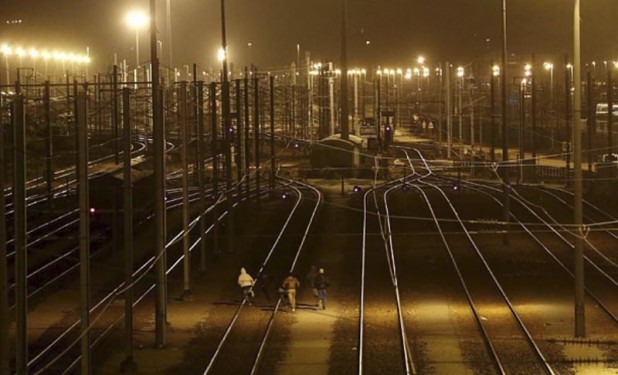The New Observer
January 11, 2016
The granting of asylum to a Sudanese invader who illegally walked most of the length of the tunnel under the Channel between France and Britain has highlighted the fact that whole sections of the British government are devoted to helping invaders bypass British laws, a new report has revealed.

The Telegraph newspaper in London—usually a staunch defender of the Conservative Party—said in a report that the country’s “Criminal Cases Review Commission” (CCRC) encourages nonwhite invaders to “challenge criminal convictions related to their entry, such as fraud or using false passports,” and thereby “quash their convictions for illegal entry to Britain.”
This fact, the newspaper continued, will “lead to thousands more arrivals.”
The CCRC is, according to its own website, an “independent public body set up to investigate possible miscarriages of justice in England, Wales, and Northern Ireland.”
It appears that this taxpayer funded organization is actually running an “unprecedented publicity campaign” aimed at “encouraging hundreds of migrants to challenge criminal convictions.”
According to the Telegraph, the CCRC has printed leaflets and posters encouraging asylum seekers to apply to it, and conducted “outreach events” with refugee organizations.
“The CCRC has already helped more than 30 asylum seekers to overturn their convictions — something which has allowed many of them to receive refugee status and stay in the UK. It is considering a further 60 cases.”
The revelations about the CCRC’s activities came to light after nonwhite illegal invader Abdul Rahman Haroun was granted asylum in Britain on Christmas Eve 2015—after he had broken dozens of laws in the European Union and the UK.

Haroun left the Sudan because, he said, it was “poor,” and managed to illegally enter Europe over the Mediterranean, breaking all official immigration laws in the process. Once in Italy, he then broke the Dublin Agreement rules which state that he should have applied for asylum in the first EU nation he reached, and then he made his way to France’s port of Calais.
On August 2015, Haroun scaled four high fortified fences, evaded security patrols, dogs, and 400 CCTV cameras inside the Eurotunnel site on the French side of the rail link, and then walked all but a “few steps” of the thirty-one mile tunnel.
Haroun walked all day in almost complete darkness, dodging trains whistling by at more than 100 miles per hour. He formed part of a large mob of invaders who stormed the Eurotunnel complex that day, all hoping to break through to get to Britain.
He was detected in the tunnel just a few yards from the UK exit near Folkstone, where he was arrested and charged with criminal obstruction of a train.
The Eurotunnel company filed a legal complaint, saying that it hoped that “the force of law will be used and justice done” so that Haroun’s illegal act “does not set a precedent for other migrants to try and do the same. Not only did he run a significant risk of being seriously injured or killed, but he has also lost all possibilities to request asylum or find work in England,” a spokesman said.
However, the Eurotunnel company was not factoring in the interference of the CCRC, and last week, prosecutors in Britain said they were going to drop the charges after Haroun was granted asylum.
The Telegraph pointed out that as well as “advertising for asylum seeker cases, the commission [CCRC] has waived its normal rules which insist that people seeking its help must first have tried to appeal through the courts in the normal way.
For British citizens, the commission states that “applying to the CCRC before you have appealed will usually be a waste of your time,” and “we usually tell people who come to us before they have appealed that they need to go back and try to appeal in the normal way.”
If the appellant is a nonwhite invader, non-British national however, the CCRC gives them priority. As the Telegraph put it: “[The CCRC] has instead fast-tracked dozens of asylum seeker cases, making up a large proportion of its workload. Despite massive demand from British citizens who say they are victims of injustice, almost a third of the people who the CCRC helped overturn their convictions last year were asylum seekers.”
According to the 1951 UN Refugee Convention, which has been taken up into British immigration law, asylum seekers cannot be prosecuted for the act of illegally entering a country if they come “directly from a territory where their life or freedom was threatened.”
In Haroun’s case—and in fact for every “asylum seeker” to reach European shores, from any direction, this is clearly not the case, as all of them, bar none, have entered Europe from countries which are “safe” and in which their life is not threated. This includes Turkey, Libya, and Tunisia, from where almost all of the current invaders originate.
The Telegraph pointed out that among the cases the CCRC had referred back to the UK’s Appeal Court were those of two Iranians, Amir Ghavami and Saeideh Afshar, who were convicted of entering Britain on fake documents.
The two invaders had first travelled from Iran to Thailand, where they spent two months, followed by three weeks in Tanzania, a week in Kenya, and three weeks in Spain—all of them “safe” countries—before entering the UK. Their convictions were subsequently overturned by the Appeal Court, and they were given “asylum” in Britain.
Another case highlighted by the Telegraph was that of the Ethiopian invader, Eyasu Mulugeta, who entered Britain legally on a visitor’s visa using his own passport but then claimed asylum under a different name, pretending he had been smuggled into the country. He was jailed for 12 months “for making false statements to gain refugee status.” His conviction was upheld and he was recommended for deportation but he is still in the UK, 12 years after first arriving, thanks to the endless appeal work created by the publicly-funded CCRC.
Other cases included those of Somalians Yasin Bashir who spent weeks in Kenya and Greece before arriving in Britain on a fake passport and Richard Sohe Nguidjol, who spent time in France before invading Britain and claiming asylum.
 Daily Stormer The Most Censored Publication in History
Daily Stormer The Most Censored Publication in History


